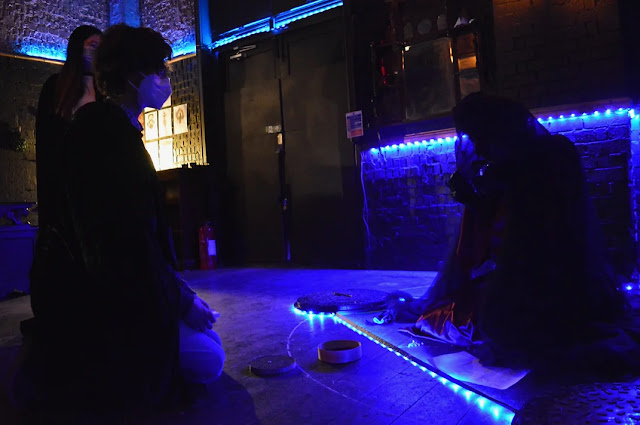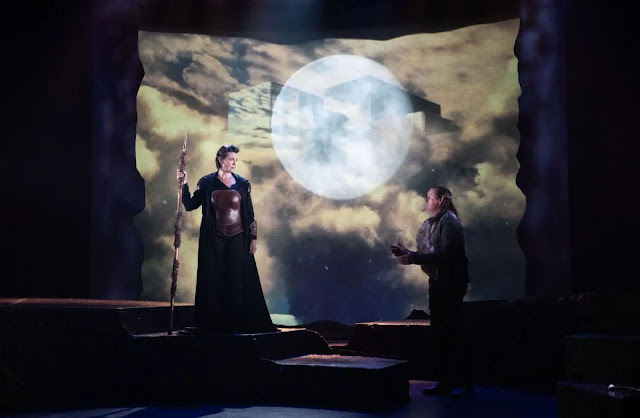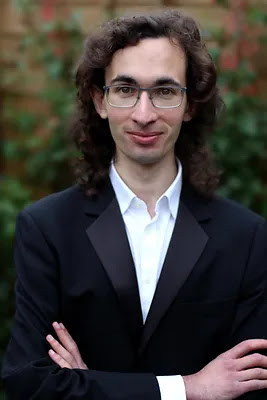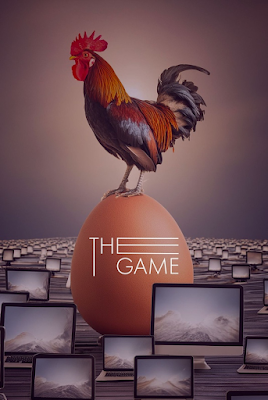Director and writer Leo Doulton has quite a varied practice, he is the marketing director of Tête à Tête, whilst as a writer he has a particular interest in interactive theatre and we caught We Sing/I Sang at Tête à Tête in 2020 [see my review]. This Summer he was assistant director on Wagner’s Die Walküre, at Longborough Festival Opera and on 28 September he directs the premiere of Elif Karlidağ and Sam Redway‘s The Game at the Cockpit Theatre as part of Tête à Tête: The Opera Festival, with singers Eliran Kadoussi, Lore Lixenberg, Hestor Dart, and Rachel Roper, actor Mayra Stergiou, and Edo Frenkel as musical director, with game and AV design by Utkucan Eken.
The Game is described as ‘blending opera with modern interactive storytelling and propelled by an experimental, narrative-driven, first-person video game’, so is it an opera at all?
Leo is firm that The Game is an opera, he describes the set-up as depicting someone who is at The Cockpit and who starts playing a game and finds that they can’t escape. On-stage there is the person playing The Game along with three singers playing the assets of the game, with a commanding off-stage voice. In many ways the piece is an absurdist comedy, examining the human situation and Leo is interested in examining how we fit into the world, and also how gameplay fits into the world. He is also relishing the challenge of doing the work at The Cockpit.
The music is by Elif Karlidağ, a Turkish/British composer whose work spans multidisciplinary art projects, community engagement, and stage productions, and she has created a genuinely funny score where three singers play the soundscape of the video game. Before being asked to direct The Game, Leo was aware of Elif Karlidag’s work as they have both been on the Guildhall School‘s Opera Making & Writing course, and he adds that this is one of the joys of Tête à Tête, that you get to meet a lot of creatives, to work with them and watch them grow and flourish.
Leo’s approach to directing a work depends on the job at hand, but he has a lot of experience bringing new work to fruition. He does not see himself as an interventionist director, but he enjoys being involved in the creation of a work, the collaborative aspect of directing. He sees his role as to fulfil the work, to make sure it is completed and to ensure that the audience understands it and has every chance to love it. As such his role is to support the other creatives, especially as he may be coming to the work fresh.
 |
| Leo Doulton in Come Bargain with Uncanny Things at Tête à Tête in 2021 |
He finds great joy in creating new work, and his practice extends to interactive operas such as We Sing/I Sang as well as the Come Bargain with Uncanny Things trilogy which he is currently working on. But he also enjoys working on pieces from the canon, finding richness and delight there. And he feels that even if you dislike chunks of the canon, if you do so in a constructive way then this can provoke greater understanding.
He admits that until he started working on Wagner’s Die Walküre at Longborough this year, he did not know the Ring, but there are few better ways to fall in love with the Ring Cycle than spending half a year working on Die Walküre and then watching three complete Ring Cycles. He loves the richness and complexity of the music and feels that it rewards you really loving it. The cycle at Longborough was directed by Amy Lane, and Leo describes her work as gorgeous, something to come back to.
But Leo also does a lot of work with UCL‘s Hebrew and Jewish studies
department, so he is very aware of the problems with Richard Wagner the
man, the dichotomy between the man and his attitudes, and his music. But
working on the Die Walküre has, in many ways, changed Leo’s attitude
completely.
 |
| Wagner: Die Walküre – Lee Bisset (Brünnhilde), Mark Le Brocq (Siegmund) – Longborough Festival Opera (Photo: Matthew WIlliams-Ellis) |
With a strong belief in live performance, Leo feels a performance should feel live and he wants to make something beautiful for the audience. Something magical happens when a particular group of people come together on stage, and he wants to welcome the audience, to treat them with warmth, especially those attending opera for the first time. It is important not to lose sight of the fact that you want the audience to have a good time.
He does believe in the right of a director to be a creative individual, the director’s right to deconstruct a work. Leo admits that he has seen some magnificent productions which deconstruct works, but also those which do not work. But as a director, he wants to say something to the audience than ‘screw you’, and with new work, you don’t want people to have to do homework beforehand. Not all works need to be riotous entertainment, and you quickly need to establish parameters and style. And these need to suit the situation; he directed Shakespeare’s Macbeth with a community company where a high-concept production would have been unsuitable.
When it comes to the musical style of a work, Leo has some interesting points to make. For him, some composers are trying to be deliberately popular and this can go well or badly, by contrast, there are those influenced by post-War modernism. Leo finds it interesting to ask such composers what popular music they listen to, and he points out that it is often taboo in some circles to talk about popular music. For Leo, the music successful is the middle ground where composers seek to reconcile the two.
 |
| Leo Doulton |
As a director, he tries to bring to life what the composer wants and we have to admit that some pieces only work well for audiences who have a body of knowledge already (and he uses the example of Jackson Pollock’s paintings). Wearing his marking director’s hat, he feels that if someone genuinely loves what they are doing, then you should get them to tell you what they love about their piece and why audiences should love it. If you can articulate this clearly enough, then you will get an audience. It is important to find the right audience for a piece, but sometimes it just clicks.
Leo is intensely interested in interactive theatre, he is a co-producer of Voidspace Festival which is a festival of interactive arts, and there he has seen an incredible range of work. He was co-director of The Key of Dreams, a 24-hour Lovecraft-inspired interactive, immersive show where the audience plays cult investigators. Leo describes it as ridiculous fun, but it was fascinating seeing how the audience came together and worked together under stress. He liked being able to give the audience a chance to play at living in extremis and ask how they would help each other.
Leo is currently crowdfunding to bring his Come Bargain with Uncanny Things trilogy to London in 2025. The intention is to take over a venue and create three different spaces, one for each element of the trilogy. The work is truly interactive and each time an audience member comes, the world inside the space would have changed a bit. It is based in a world where there are supernatural beings, and you the audience can make deals with them, relating to small, human-scale problems. Yet making a deal with such creatures is also quite dangerous, so the work is about dealing with powers that are bigger than you. The trilogy asks questions about power by letting the audience play at being humans in a world where they have to deal with a greater power. He describes the trilogy as a vibrant fantasy. His show We Sing/I Sang was an early iteration of the idea of the audience interacting with and affecting the work.
He often feels that in conventional opera we can wonder why people are singing. Music can reference emotions, letting us know that we should be tense or should relax, telling the audience they should be frightened now. For Leo, music exists to build a new world, as well as simply giving you the character.
Elif Karlidağ and Sam Redway: The Game
Eliran Kadoussi, Lore Lixenberg, Hestor Dart, Rachel Roper, Mayra Stergiou, game and AV design by Utkucan Eken, musical director Edo Frenkel, director Leo Doulton
28 September, the Cockpit Theatre, Tête à Tête: The Opera Festival [further details]
Also on the same day at the Cockpit: Ghost from Anna Appleby and Emma Wheeler, see my article
The blog is free, but I’d be delighted if you were to show your appreciation by buying me a coffee.
Elsewhere on this blog
- Web of influences: Harry Christophers & The Sixteen’s Choral Pilgrimmage at Old Royal Naval College Chapel, Greenwich – concert review
- L’Olimpiade: Vache Baroque makes an engaging case for Pergolesi’s penultimate opera – opera review
- A subtle depiction of a complex man: Green Opera’s 555, Verlaine en prison at Grimeborn – opera review
- Scaling the peak: David Skinner on recording Byrd’s The Great Service with Alamire reflecting new ideas about pitch and scoring – interview
- Discovering Imogen: A relatively underrated British composer, Imogen Holst is put centre stage in this brand-new recording on NMC – record review
- Exquisite vocal lines & imaginative storytelling: Harry Christophers & The Sixteen focus on Stanford’s secular choral music in Partsongs, Pastorals and Folksongs – record review
- Music of a Silent World: Chanticleer in an eclectic recital exploring the natural world – review
- A Road Less Travelled: in advance of its London premiere, Alec Roth discusses his 2017 song cycle to poems by Edward Thomas – interview
- Drawing you in: Ensemble OrQuesta combined physical theatre with comedy & a sense of anger in Mozart’s Le nozze di Figaro at Grimeborn – opera review
- To Lviv with Love: Paul
Mann combines conducting in the Ukraine with investigating neglected
composers for Toccata Classics, including the Swiss composer Richard
Flury – interview - Home










